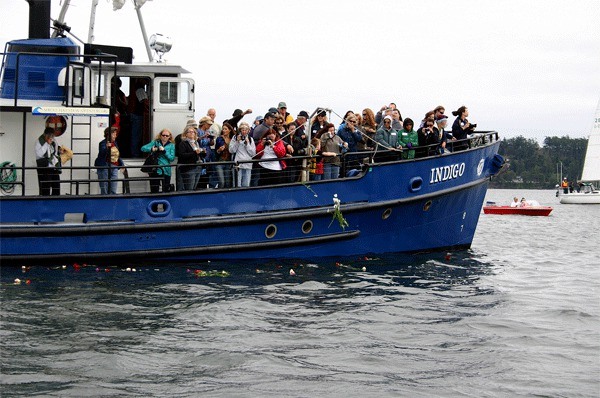Whether it’s because of her heartbreaking story, her connection to Whidbey Island or the calls to her family that make her pain all too human, Lolita the orca whale has touched the lives of many. Dozens of people with heavy, yet hopeful, hearts boarded ships from the Coupeville Wharf on Sunday with one thought on their minds – bringing her home.
Lolita was captured from Penn Cove on Aug. 8, 1970. Between 1965 and 1973, 45 whales of the Southern Resident community were taken from Penn Cove and were delivered to marine parks. Of those 45 whales, only Lolita is still surviving.
Lolita has been working as a performer at the Miami Seaquarium for 40 years, which is the second longest time a whale has been held in captivity. Aside from a few dolphins, Lolita has been living alone for 30 years. She resides in the smallest and oldest tank in North America; its dimensions are only one and a half times her size, and critics say it violates the U.S. Department of Agriculture’s Animal and Plant Health Inspection Service Regulations. In addition to those unsettling facts, according to Howard Garrett of the Orca Network, scientists say there’s an 80 percent chance that oil from the BP spill will enter Lolita’s tank.
Coupeville resident Clarence Hein often volunteers for the Orca Network. He said he hopes the oil threat will convince the Seaquarium officials that Lolita shouldn’t be there.
“They know where she belongs,” he said.
Members from the Orca Network and other concerned citizens have been petitioning and e-mailing decision makers to try and persuade them to retire Lolita and allow her to return to the Pacific Northwest. The Orca Network knows where Lolita’s pod resides and has located her 82-year-old mother. After four decades of separation, Lolita still uses her pod’s unique language.
Puyallup resident Audra Beavers brought her family to Sunday’s events to offer support. Her 9-year-old son Trevor saw video footage of Lolita earlier in the year and was motivated to get involved with the movement. He started a Facebook page to raise awareness of the campaign and has sold “Let Lolita Live” t-shirts to raise money for the effort.
“It’s just so awful, the whole thing,” Beavers said. “We just don’t want her to die there all alone. She’s going to be back soon. We’re not going to give up. We’re going to keep fighting.”
Beavers joined others aboard the Indigo and Cutty Sark to commemorate the captured whales. Kayakers, motor boaters and other sailors joined the crowd in a circle, released flowers into the water at the capture site and sang a song to Lolita.
Garrett led the movement. He called people’s attention to the now empty waters and asked them to picture what Penn Cove would be like if hundreds of whales still roamed its waters.
“Let’s bless this place,” Garrett said before the flowers were dropped. “Let us cleanse it. Let them feel it. Visualize Lolita back here.”
More on Lolita
Campaign to retire Lolita: Orca Network, Greenbank, WA 98253; 360-678-3451; www.savelolita.com.



